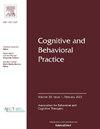Adapting Cognitive Behavioral Therapy for Depression After Traumatic Brain Injury: A Case Study
IF 2.9
3区 心理学
Q1 PSYCHOLOGY, CLINICAL
引用次数: 0
Abstract
This case study describes a cognitive-behavioral treatment for depression adapted for individuals with traumatic brain injury (CBT-TBI) and provides a case description of a patient who experienced meaningful symptom reduction. CBT-TBI includes several adaptations to traditional CBT for depression structure, content and process aimed at meeting the unique needs of individuals with TBI sequelae. The patient, a single, White, college-educated, cisgender female in her late 30s who sustained a complicated mild TBI and endorsed symptoms of depression, anxiety, and persistent post-concussive symptoms, completed 12 individual, in-person sessions of CBT-TBI in the context of a randomized, waitlist-controlled trial. Clinician and self-rated measures, as well as neuropsychological assessments, were completed at baseline and posttreatment, and depressive symptoms were assessed weekly by self-report (Beck Depression Inventory-II). Symptom improvement was analyzed using the Reliable Change Index (RCI) and demonstrated a clinically significant reduction in depression and anxiety symptoms, as well as improvement in coping abilities and adaptive thinking. In addition to the adapted content of the intervention, this case example highlights the importance of therapist flexibility, continual assessment, collaboration, and elicitation of feedback in the delivery of CBT for depression for individuals with TBI.
对创伤性脑损伤后抑郁症的认知行为疗法进行调整:案例研究
本案例研究描述了一种适用于创伤性脑损伤(CBT-TBI)个体的抑郁症认知行为治疗方法,并提供了一个患者经历有意义的症状减轻的案例描述。CBT-TBI包括对传统CBT抑郁症结构、内容和过程的几种适应,旨在满足TBI后遗症患者的独特需求。患者是一名单身白人,受过大学教育,30多岁的顺性别女性,患有复杂的轻度脑外伤,并伴有抑郁、焦虑和持续的脑震荡后症状,在一项随机、候补对照试验中,她完成了12次单独的、面对面的CBT-TBI治疗。临床和自评测量,以及神经心理评估,在基线和治疗后完成,每周通过自我报告评估抑郁症状(贝克抑郁量表- ii)。使用可靠变化指数(RCI)对症状改善进行分析,结果显示抑郁和焦虑症状在临床上有显著减少,应对能力和适应性思维也有改善。除了调整干预的内容外,本案例还强调了治疗师灵活性、持续评估、协作以及在为TBI患者提供CBT治疗抑郁症的过程中获取反馈的重要性。
本文章由计算机程序翻译,如有差异,请以英文原文为准。
求助全文
约1分钟内获得全文
求助全文
来源期刊

Cognitive and Behavioral Practice
PSYCHOLOGY, CLINICAL-
CiteScore
4.80
自引率
3.40%
发文量
118
审稿时长
84 days
期刊介绍:
Cognitive and Behavioral Practice is a quarterly international journal that serves an enduring resource for empirically informed methods of clinical practice. Its mission is to bridge the gap between published research and the actual clinical practice of cognitive behavior therapy. Cognitive and Behavioral Practice publishes clinically rich accounts of innovative assessment and diagnostic and therapeutic procedures that are clearly grounded in empirical research. A focus on application and implementation of procedures is maintained.
 求助内容:
求助内容: 应助结果提醒方式:
应助结果提醒方式:


